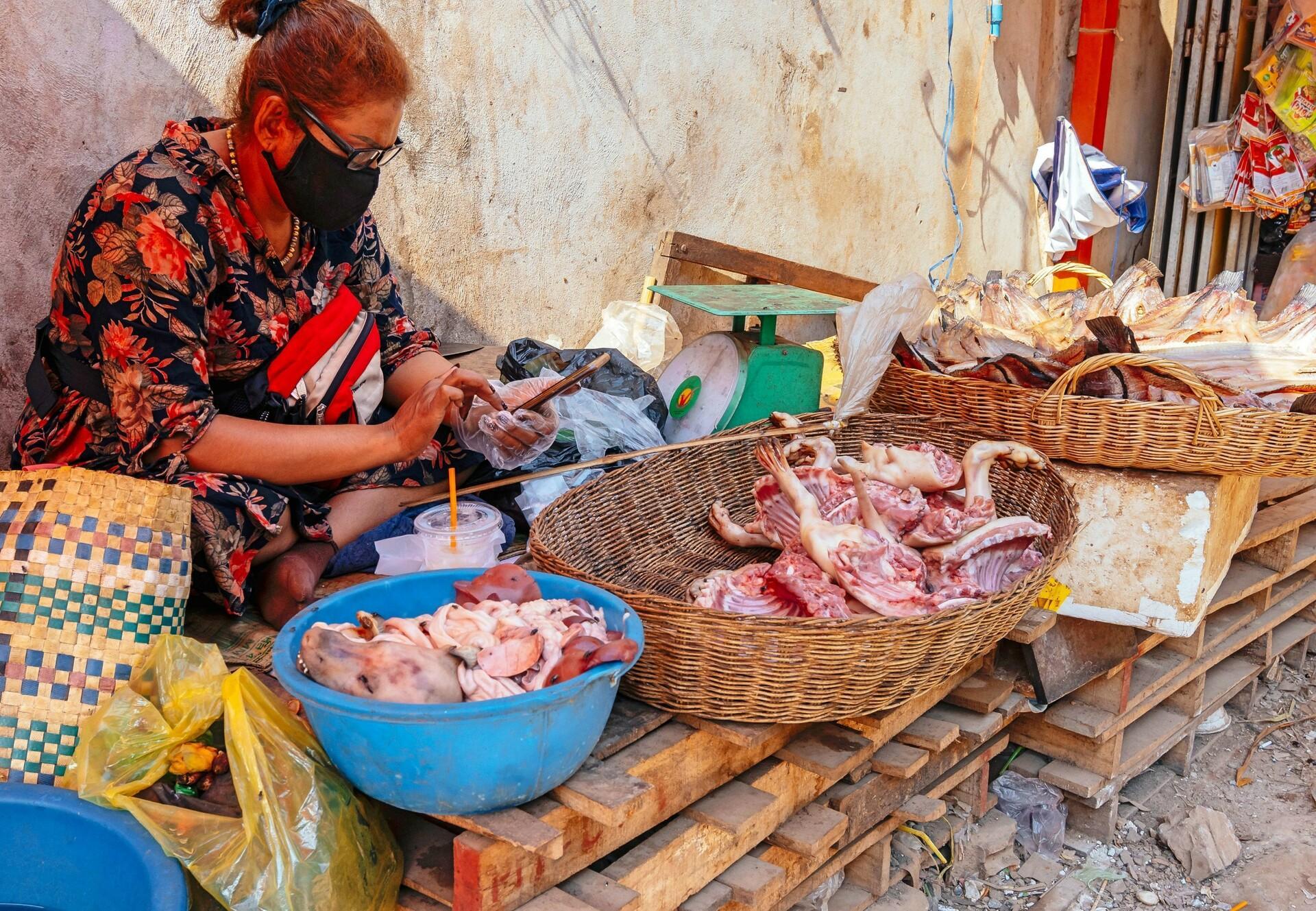
While China bans dog and cat meat, trade in Southeast Asia is thriving
FOUR PAWS reveals new dog and cat meat trend amongst global pandemic
2nd April 2020 – In the wake of the COVID-19 pandemic, the Chinese city of Shenzhen has banned the eating of dogs and cats as part of a wider clampdown on the wildlife trade. In neighbouring Vietnam as well as in Cambodia and Indonesia, however, dog and cat meat is on the rise.
According to global animal protection organisation FOUR PAWS, an estimated ten million dogs and cats are brutally slaughtered for consumption in these three countries every year. Despite the global pandemic FOUR PAWS has documented the continued sale of dog and cat meat in the region, transition from a ‘dine-in’ to a ‘to-go’ service, and the advertisement of dog and cat meat dishes on a smartphone food delivery app. Many customers have cited the perceived health benefits of the meat as their reason for consumption. However, FOUR PAWS warns of its serious human health risk, with the uncontrolled spread of rabies being only one of them. In addition, the animals are often sold at live animal markets across Southeast Asia – the place of origin of the novel coronavirus.
“The unsanitary conditions associated with the cat and dog meat trade, coupled with the contamination risks of having so many different animal species caged and killed alongside one another, present the perfect breeding ground for new and deadly diseases, like COVID-19. Although most local people in Southeast Asia oppose dog and cat meat, the trade in around ten million animals per year has continued to serve as a niche business, says Dr Katherine Polak, veterinarian and head of FOUR PAWS Stray Animal Care in Southeast Asia.
“The rampant trade and live animal markets across Southeast Asia are ticking time bombs. If governments do not act now and shut down these cruel markets, the next global pandemic might originate in Vietnam, Cambodia or Indonesia”, says Dr Katherine Polak.
Booming business despite pandemic
The World Health Organization (WHO) states that 70 per cent of global disease-causing pathogens discovered in the past 50 years came from animals, and COVID-19 is no different. Despite the public health risk such animal trades present, many dog and cat meat restaurant owners report that business has actually increased during the pandemic.
One seller in Cambodia told FOUR PAWS that those in her community believe that, ‘dog meat is good for health and helps ward off cold or viral illness, like COVID-19’. Others prefer to eat dog meat because it is perceived to be ‘natural, without chemicals, and safe to eat’. The reality, however, is that dog meat is far from safe, and is linked to outbreaks of cholera, and cases of trichinella and rabies.
Take-away and delivery service: Dog and cat meat trade adapts
With more than 110 dog meat restaurants around Cambodia’s capital city of Phnom Penh, many opening less than two years ago, the service model has adapted to the current social and economic situation posed by the COVID-19 outbreak by transitioning their business model from serving customers inside restaurants to providing take-away service. Vendors in Cambodia are seen wearing masks standing on the side of the road, providing bags of dog meat to customers to eat or prepare in the home.
In Vietnam, a similar trend has been observed particularly in the north of country, where dog and cat meat consumption has a longstanding history. But the newest development allowing dog meat restaurants to adapt to the current COVID-19 situation includes the use of delivery apps such as now.vn – one of Vietnam's most popular delivery services founded by restaurant review platform Foody. Dog and cat meat restaurants across the country are advertising dog and cat meat dishes for delivery on the Foody website and app.
FOUR PAWS’ fight against the dog and cat meat trade
In order to put a sustainable end to the brutal dog and cat meat trade in Southeast Asia, FOUR PAWS has launched a campaign on an international and national level. Through educational work and cooperation with the responsible authorities and tourism associations, the goal is to get governments in Southeast Asia to introduce animal protection laws which bring an end to the capture, slaughter and consumption of dogs and cats. Furthermore, FOUR PAWS supports local animal welfare organisations and communities with humane and sustainable stray animal care programmes. FOUR PAWS is also part of the animal welfare coalitions DMFI (Dog Meat Free Indonesia) and ACPA (Asia Canine Protection Alliance), which lobby against the trade in Southeast Asia.
In addition, FOUR PAWS has launched a petition against the dog and cat meat trade, which has already been signed by over 640,000 supporters worldwide since it launched late last year: https://help.four-paws.org/en/end-dog-and-cat-meat-trade-southeast-asia
Follow us on social media
Stay up to date on this topic and on all FOUR PAWS activities on our social media channels:
About FOUR PAWS
FOUR PAWS is the global animal welfare organisation for animals under direct human influence, which reveals suffering, rescues animals in need and protects them.
Founded in 1988 in Vienna by Heli Dungler and friends, the organisation advocates for a world where humans treat animals with respect, empathy and understanding. The sustainable campaigns and projects of FOUR PAWS focus on companion animals including stray dogs and cats, animals in fashion, farm animals, and wild animals – such as bears, big cats, and orangutans – kept in inappropriate conditions as well as in disaster and conflict zones.
With offices in Australia, Austria, Belgium, Bulgaria, France, Germany, Kosovo, the Netherlands, Switzerland, South Africa, Thailand, Ukraine, the UK, the USA, and Vietnam as well as sanctuaries for rescued animals in eleven countries, FOUR PAWS provides rapid help and long-term solutions. www.four-paws.org.au

